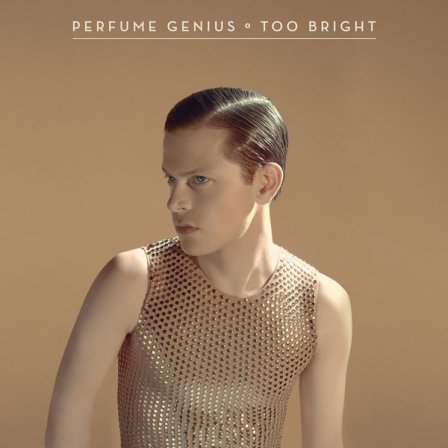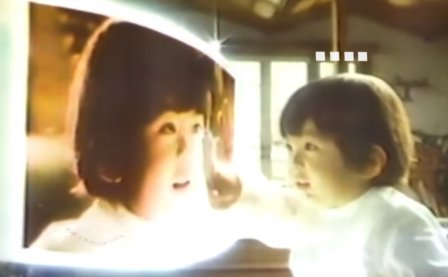Seattle-based Mike Hadreas’ third album as Perfume Genius is a step forward for the project in almost every way. Too Bright boasts harder-hitting lyrics, more sophisticated arrangements, and his best-fitting production yet. Its musical successes are obvious in their immediacy and variety, which gives Hadreas’ career the critical allure of an arc, this latest release continuing a smart progression from Learning to Put Your Back N 2 It. That alluring arc is the kind of neat story that Perfume Genius works over and against here, eroding pop expectations with his fractured vulnerability. Too Bright knows too much to believe fully in clean arcs, progress narratives, or cohesive identities. But the album does believe in their representative power and the power released when that representation is thwarted through play or ruptured by sheer force.
Hadreas disrupts our expectations from the beginning. With delicate opener “I Decline,” the album seems to pick up right where “Sister Song” left us on Put Your Back N 2 It. Using that song’s same spare piano, strings, and vocal delivery, he politely denies the salvation promised to him by “an angel above the grid.” It’s a denial of the grace that got us to this point using the voice of what got us to this point. This first denial makes way for an icon more useful to him. First single “Queen” is a reclamation of menace that ushers in a new tonal palette for Perfume Genius (a decline to sound the same) and a rage that simmers beneath the rest of the album (a decline to sing for everybody else).
“Queen” signals Hadreas as an emerging gay pop icon, but he makes a rocky fit for the dominant narrative that condones a quickening to homonormativity. The song leads us in a slow-building synth march to the Tumblr-ready haymaker, “No family is safe/ When I sashay.” The keys are sickly sweet, rotting from the inside like the normalcy-eating monster he’s embraced (but only up to a point). A triumphant mash-back with a chorus to die for still relies on the reality of persecution. This character is more than play or exaggeration for anyone whose walk speaks volumes to structurally-empowered haters. Too Bright proves Hadreas is equipped to plunder the depths of his personal experience to reemerge with real political resonances. Progress has its fissures, and “Queen” opens the album up to explore them. It breaths and bleeds in these interstices: the shame lurking within pride, the fearful look accompanying the sneer, the loneliness between communities, the contradictory drives behind desire. Perfume Genius’ pop is queer spacemaking, which sometimes means taking up new voices (wails, sighs, and roars) to recall buried pain and sing the body symptomatic.
Too Bright is sequenced to look ahead and inward, fulfill its own prophecies, stumble over promises, and blame itself. There are no clean breaks on the album, because the songs open up affective channels in each other. On “No Good,” a moving elegy for lost loves who helped him feel alright in passing, Hadreas feels “all used up/ Never used enough.” That pain and frustration gives way to the self-loathing grind of “My Body,” which is caught between tracks that proclaim “the body is no good” and that Hadreas is “trapped in this body.” The Cronenberg/Shore synthsploitation of “Longpig” scores the battlecry, “Sister/ Bury me/ For mama,” only to drop off into the pitched-down whine of “I Am A Mother,” where we finally meet the Ancient Queen he’d warned us about earlier, now buried “down here,” left hopelessly alone. The grid from “I Decline” is later revealed as a dystopian maze on “Grid.” As his lyrics trace a topsy-turvy conversation between satisfaction and breakdown, subversion and self-sabotage, the music clings to pop structures only to relish their upheaval.
The sunny groove of “Fool” is a cartoon façade of coo-oo-ool that covers the fear of coming out of another prescribed role. The song falters when Hadreas leaves the room, which has come to feel like a walk-in closet, and lets his voice cry out to Jónsi heights. Snapping back into rhythm after the outpour, it becomes clear that Hadreas fools us as a way to fool himself, if only for a moment, that he doesn’t have to cry (and all of this in the wake of anthemic “Queen”). From the aching piano coda of “No Good” to the guttural screaming of “Grid,” the catharses feel like last resorts, damming the next track about to burst. It is not an album at ease, even if that posture is struck on closer “All Along.” After airing out all these looks, Hadreas makes no attempt to stitch them together, but lets them speak for themselves. With the assured proclamation, “I don’t need your love/ I don’t need you to understand/ I need you to listen,” Hadreas suggests he’s learned to love and understand the voices he contains at least a little bit, maybe just enough for now.
Although the album is less explicitly autobiographical, Perfume Genius has never sounded more intimate. In its most forward-looking moments, he is still reflecting on himself; but at its most insular, he seems to be speaking for multitudes. There’s a collectivizing vulnerability earned by singing on behalf of ancient queens, monster mothers, and tortured fools. When he champions these contradictory selves, he’s redeploying outmoded performances and gestures in the grander context of the flawed, incomplete, and disintegrating narratives that nevertheless undergird our social expectations of, and ethical commitments to, identities that are (still) considered unworthy. Hadreas is telling honest stories that hold us up even as he exposes their inadequacies, because our language is lacking otherwise. That Hadreas weaves these self-annihilating mythologies into something like triumph is the power behind his radical perversion of pop: to deliver the anthems we truly deserve. We only need to listen.
More about: Perfume Genius




